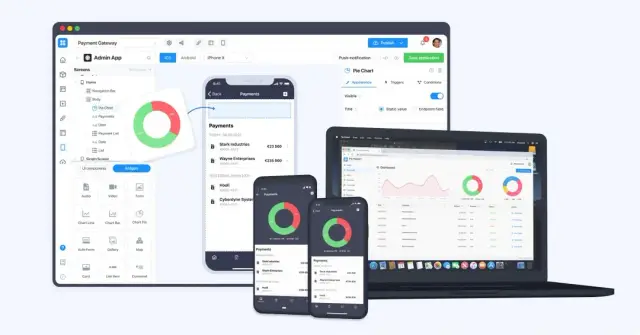Personalized Shopping: Ecommerce Apps that Understand Customers
Explore the world of personalized ecommerce apps, how they're revolutionizing the shopping experience, and the role of no-code platforms like AppMaster in their development.

The Growing Importance of Personalized Shopping
Online shopping has revolutionized the way people buy products and services. With the rapid evolution of technology, ecommerce has become increasingly sophisticated, providing customers with a more personalized and engaging experience. Personalized shopping is all about understanding customer preferences and behavior, and tailoring the shopping experience accordingly. This personal touch has become a key factor in attracting and retaining customers in a highly competitive market.
Consumer expectations for personalized experiences have risen dramatically over the past several years. Today's shoppers demand relevant recommendations, targeted promotions, and seamless interactions across digital touchpoints. As retailers strive to meet these expectations, personalized shopping has evolved from being a "nice-to-have" feature to a critical element of success in the ecommerce space.
Personalized shopping experiences help retailers stand out, build lasting relationships with their customers, and drive customer loyalty. Companies investing in personalization technologies and strategies often see increased customer satisfaction, engagement, and sales. In this context, personalized ecommerce apps have become essential for retailers looking to provide exceptional customer experiences and remain competitive.
How Personalized Ecommerce Apps Are Transforming Shopping
Personalized ecommerce apps have transformed how people shop online by delivering tailored product recommendations, personalized promotions, and optimized user interfaces based on individual customer behaviors and preferences. These intuitive and customized experiences reduce friction and make the shopping journey more enjoyable for customers. Here's a look at some of the ways personalized ecommerce apps are revolutionizing shopping:
- Personalized product recommendations: By analyzing a customer's browsing history, past purchases, and preferences, personalized ecommerce apps deliver accurately curated product recommendations that resonate with the customer's needs and interests. This increases the likelihood of a purchase and can drive long-term customer loyalty.
- Targeted promotions and discounts: Personalized ecommerce apps enable retailers to send promotions and discounts tailored to individual customers. By delivering promotions based on the customer's previous interactions and preferences, these apps increase the chances of conversion and drive more sales.
- Optimized user interfaces: Personalized ecommerce apps optimize the user interface for each customer, making it easier for shoppers to find what they're looking for and enjoy a seamless browsing experience.
- Improved search functionality: Personalized ecommerce apps can enhance search functionality by prioritizing search results based on an individual's preferences and browsing history.
- Location-based offers: By leveraging a customer's geographical location, personalized ecommerce apps can provide location-specific deals, product availability updates, and delivery estimates, enhancing the shopping experience.
As technology advances and consumer demands continue to evolve, personalized ecommerce apps are playing an increasingly important role in enhancing the shopping experience, driving online sales, and fostering strong customer relationships.

The Benefits of Personalized Ecommerce Apps for Retailers and Shoppers
Personalized ecommerce apps provide benefits for both retailers and shoppers, some of which include:
- Enhanced customer engagement: By tailoring the shopping experience to individual preferences, personalized ecommerce apps boost customer engagement levels and encourage repeat visits and long-term loyalty.
- Increased conversion rates: Personalized product recommendations, targeted promotions, and intuitive user interfaces increase the likelihood of making a sale, leading to higher conversion rates.
- Improved customer retention: By consistently delivering relevant, personalized content, ecommerce apps contribute to developing strong, meaningful customer relationships, increasing retention rates over time.
- Better customer satisfaction: Personalized ecommerce apps enhance the shopping experience, providing customers with a smooth, enjoyable journey that aligns with their needs and desires. This, in turn, boosts customer satisfaction levels.
- Competitive differentiation: In an increasingly crowded retail sphere, personalized ecommerce apps help retailers stand out by offering unique, individualized shopping experiences.
- Streamlined operations: Personalization tools and features can help retailers better understand their customer base, allowing them to streamline merchandising, inventory management, and marketing strategies.
- Increased average order value: Personalized recommendations and promotions encourage customers to buy more products, increasing the average order value.
By leveraging the power of personalized ecommerce apps, retailers can create engaging, relevant shopping experiences that can lead to higher customer satisfaction, improved loyalty, and increased revenue.
Creating Personalized Ecommerce Applications with No-Code Platforms
No-code platforms are becoming increasingly popular for creating personalized ecommerce applications. These platforms enable businesses to build custom applications without writing a single line of code. They provide a faster, more efficient way to deliver rich, engaging ecommerce experiences to customers, helping businesses to stay competitive in today's rapidly evolving digital marketplace.
With no-code platforms, businesses can create and deploy personalized ecommerce apps using pre-built components and features. This approach reduces the time, effort, and cost that traditionally go into custom app development. In addition, no-code platforms facilitate quick iteration and rapid prototyping, allowing businesses to continually refine and optimize their ecommerce apps based on user feedback and changing market conditions. Some of the benefits of using no-code platforms for personalized ecommerce app development include:
- Reduced development time: No-code platforms eliminate the need for complex programming, reducing the time required to build customized ecommerce apps.
- Lower development costs: The streamlined development process facilitated by no-code platforms often translates to lower development costs than traditional custom app development.
- Improved flexibility and adaptability: No-code platforms allow businesses to quickly and easily modify their ecommerce apps to adapt to changing customer demands and market conditions.
- Accessibility for non-developers: No-code platforms enable non-technical team members to contribute to the app development process, empowering more stakeholders to shape the final product.
AppMaster: Accelerating Personalized Ecommerce App Development
AppMaster is a powerful no-code platform designed to simplify and accelerate the development of personalized web, mobile, and backend applications, including ecommerce apps. Built to make application development 10x faster and 3x more cost-effective, AppMaster provides a comprehensive suite of tools for creating custom ecommerce apps that understand and respond to customers' needs and preferences.
By leveraging the features and capabilities of the AppMaster platform, businesses can quickly design, build, and deploy personalized ecommerce applications that offer an intuitive, user-friendly shopping experience. AppMaster's visual data modeling, drag-and-drop UI design, customizable business logic, and auto-generated REST API and WSS endpoints make it easy to create customized ecommerce solutions that stand out in the competitive online retail industry.
Key Features of AppMaster for Ecommerce App Creation
When it comes to creating personalized ecommerce applications, AppMaster offers a powerful suite of features designed to make the process as efficient and productive as possible:
- Visual Data Modeling: AppMaster enables developers to create data models (i.e., database schema) visually, without the need for complex code. This feature streamlines the process of defining and managing the data structures that underpin ecommerce applications.
- Drag-and-Drop UI Design: With AppMaster, businesses can create visually appealing, intuitive user interfaces for their ecommerce apps using a simple drag-and-drop interface. This feature allows developers to design the UI quickly and easily, without the need for expert design skills.
- Customizable Business Logic: AppMaster offers the flexibility to define custom business logic using visual Business Process (BP) Designers. By creating custom BPs, developers can ensure their ecommerce apps respond intelligently to customer behavior, delivering a personalized shopping experience.
- Rapid App Deployment: AppMaster's streamlined development process allows businesses to generate and deploy new ecommerce applications in under 30 seconds. This rapid deployment capability ensures businesses can quickly respond to changing market conditions and customer demands.
- Scalable Solutions: With AppMaster's compiled backend applications and support for PostgreSQL-compatible databases as the primary database, businesses can create scalable ecommerce solutions suitable for enterprise and high-load use-cases.

How to Get Started with AppMaster for Your Personalized Ecommerce Solution
Building a personalized ecommerce application can be complex, especially when catering to a diverse and growing audience. Yet, with the right no-code platform, like AppMaster, you can accelerate the development process and create your customized ecommerce app more efficiently and cost-effectively. Below is a step-by-step guide on how to get started with AppMaster to develop your personalized ecommerce solution.
Sign up for a Free Account
Visit the AppMaster website and sign up for a free account. The free account allows you to explore the platform and its various features without any cost commitment. This is an ideal starting point for new users who want to test the platform and understand their requirements.
Choose the Right Subscription Plan
Explore the different subscription plans offered by AppMaster, which cater to a wide range of customer needs: - Learn & Explore (free) - Startup ($195/mo) - Startup+ ($299/mo) - Business ($955/mo) - Business+ ($1575/mo) - Enterprise (Custom Pricing) Depending on the size and complexity of your ecommerce app development project, choose the plan that best suits your needs. For startups, educational institutions, non-profit organizations, and open-source projects, special pricing options are available.
Design Your Data Models
With AppMaster, you can visually create data models for your personalized ecommerce app. The platform allows you to define the structure of your database schema without the need for traditional coding. By utilizing the visual data modeling features, you can quickly set up the foundation of your application's data management.
Create the User Interface (UI)
AppMaster provides a user-friendly drag-and-drop interface for designing the UI of your ecommerce app. By choosing from a wide range of available components, you can build a fully interactive and customized UI for your personalized ecommerce platform, ensuring a seamless shopping experience for your customers.
Develop Business Logic and Processes
AppMaster offers a visual Business Process (BP) Designer to create and manage the business logic of your ecommerce app. The BP Designer allows you to define the flow of data and actions in your application, ensuring efficient management of its core functionality. This process allows you to implement the necessary personalization features, such as tailored product recommendations and promotions.
Integrate APIs and Other Services
With AppMaster's support for REST API and WSS endpoints, you can integrate third-party services, such as payment gateways, shipping providers, and customer relationship management (CRM) systems, into your ecommerce app. This enables your app to access various external resources and services, improving its functionality and user experience.
Test, Deploy, and Update Your App
Before deploying your personalized ecommerce app, ensure that it meets all your requirements and undergoes rigorous testing for optimal performance. AppMaster allows you to generate and deploy your app within minutes, making the process seamless and efficient. Moreover, with its easy-to-use tools and features, updating and maintaining your app is a hassle-free experience. In conclusion, AppMaster provides a powerful no-code platform that enables developers to create personalized ecommerce applications with ease.
By following the steps outlined above, you can build an effective ecommerce app that caters to the growing demands for tailored shopping experiences, driving increased customer engagement and conversions for your business.
Future Trends in Personalized Shopping
Personalized shopping is set to continue its trajectory of highly tailored and sophisticated experiences. Here, we explore the cutting-edge innovations that are poised to redefine ecommerce personalization.
Emerging Technologies Shaping Personalization
Soon, we can expect emerging technologies to play a pivotal role in enhancing personalized shopping. Augmented Reality (AR) is set to transform the way customers visualize products, allowing them to see how items like furniture or clothing would look in their own space before making a purchase. This immersive technology promises to bridge the gap between online shopping and the tactile gratification of in-store experiences.
The Internet of Things (IoT) also holds vast potential for personalization. With connected devices continuously gathering consumer data, ecommerce platforms can leverage this information to provide real-time, context-aware suggestions. For example, a smart refrigerator could suggest shopping lists to replenish items running low, integrating seamlessly with a favorite grocery shopping app.
Voice commerce is another area to watch. Personalized voice shopping experiences will become more refined as voice assistants become more ubiquitous. Ecommerce brands will tailor their vocal interfaces to individual users, streamline the purchase process, and make recommendations based on voice search history.
Predictions for the Future of Personalized Ecommerce
Advancements in data analytics and artificial intelligence (AI) will lead to even more nuanced personalization, blurring the lines between virtual and physical shopping worlds. Algorithms capable of predictive analytics will suggest items based on past purchases and preempt future needs, offering anticipatory service that mimics a personal shopper.
Consumer privacy and consent will continue to shape the way personalization evolves. As users become more concerned about how their data is used, ecommerce platforms will have to find innovative ways to personalize without infringing on privacy. This may include developing more transparent data policies and deploying personalization techniques that do not rely on sensitive data.
The growth of personalized subscription models will likely accelerate, with services offering customized boxes of goods, from food to clothing, based on individual preferences. These will evolve to accommodate not just preferences, but also spontaneous desires and changing circumstances as AI becomes more adept at reading and predicting subtle signals from consumers' behavior.
Finally, blockchain technology could revolutionize the trust and transparency in personalized shopping. By securely and transparently tracking the data used for personalization, blockchain could give customers greater control over their personal information, thus enhancing trust in personalized ecommerce services.
The future of personalized shopping is set to be shaped by adopting these technologies, the continuous improvement of AI, and the dynamic interplay between personalization and privacy. As ecommerce apps and platforms become more sophisticated in how they understand and cater to individual customers, we will likely see a shift towards personalized experiences that are as unique as the customers themselves, all while navigating the complex environment of data ethics and consumer rights.
FAQ
Personalized shopping refers to the practice of tailoring online shopping experiences based on an individual customer's preferences, behavior, and browsing history.
Personalized ecommerce apps improve the shopping experience by delivering tailored product recommendations, personalized promotions, and optimized user interfaces based on individual customer behaviors and preferences.
Benefits of personalized ecommerce apps include increased customer engagement, higher conversion rates, improved customer loyalty, and overall enhanced shopping experiences.
No-code platforms like AppMaster enable developers to quickly and cost-effectively build personalized ecommerce apps using pre-built components and features, without the need for complex programming.
AppMaster offers features like visual data modeling, drag-and-drop UI creation, customizable business logic, REST API and WSS endpoints, and rapid app deployment for an efficient ecommerce app development process.
To get started with AppMaster, create a free account and explore the various subscription plans and features available for ecommerce app development.
Yes, AppMaster offers special pricing for startups, educational institutions, non-profit organizations, and open-source projects. Please visit the AppMaster pricing page for more details.





